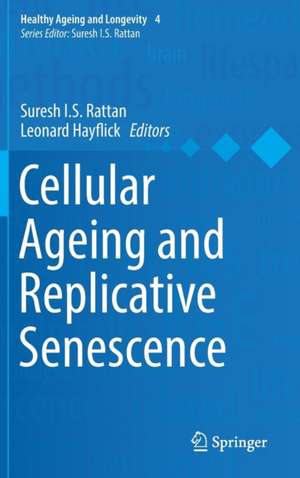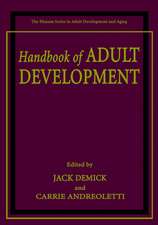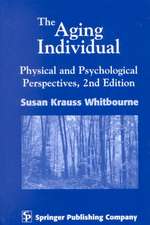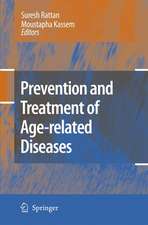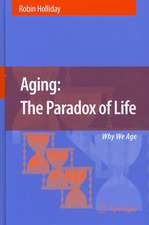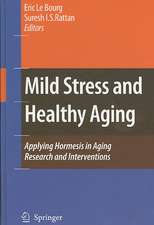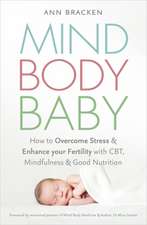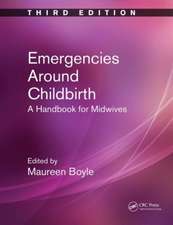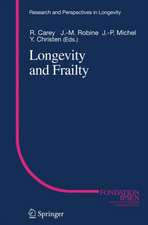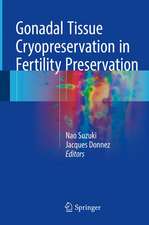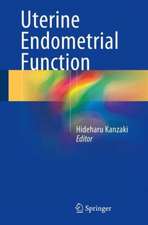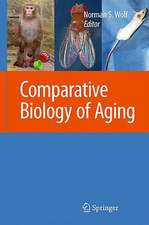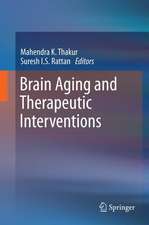Cellular Ageing and Replicative Senescence: Healthy Ageing and Longevity, cartea 4
Editat de Suresh I.S. Rattan, Leonard Hayflicken Limba Engleză Hardback – 17 mai 2016
Cellular Ageing and Replicative Senescence is organized into five sections: history and origins; serial passaging and progressive ageing; cell cycle arrest and senescence; system modulation; and recapitulation and future expectations. These issues are discussed by leading thinkers and researchers in biogerontology and cytogerontology. This collection of articles provides state-of-the-art information, and will encourage students, teachers, health care professionals and others interested in the biology of ageing to explore the fascinating and challenging question of why and how our cells age, and what can and cannot be done about it.
| Toate formatele și edițiile | Preț | Express |
|---|---|---|
| Paperback (1) | 644.18 lei 6-8 săpt. | |
| Springer International Publishing – 26 mai 2018 | 644.18 lei 6-8 săpt. | |
| Hardback (1) | 650.55 lei 6-8 săpt. | |
| Springer International Publishing – 17 mai 2016 | 650.55 lei 6-8 săpt. |
Din seria Healthy Ageing and Longevity
- 5%
 Preț: 1167.95 lei
Preț: 1167.95 lei - 5%
 Preț: 716.09 lei
Preț: 716.09 lei - 5%
 Preț: 1291.01 lei
Preț: 1291.01 lei - 5%
 Preț: 1027.69 lei
Preț: 1027.69 lei - 5%
 Preț: 730.92 lei
Preț: 730.92 lei - 15%
 Preț: 651.67 lei
Preț: 651.67 lei - 18%
 Preț: 1125.09 lei
Preț: 1125.09 lei - 5%
 Preț: 1039.95 lei
Preț: 1039.95 lei - 5%
 Preț: 1278.94 lei
Preț: 1278.94 lei - 5%
 Preț: 1015.12 lei
Preț: 1015.12 lei - 18%
 Preț: 1127.28 lei
Preț: 1127.28 lei - 18%
 Preț: 1224.68 lei
Preț: 1224.68 lei - 5%
 Preț: 1100.85 lei
Preț: 1100.85 lei - 24%
 Preț: 794.30 lei
Preț: 794.30 lei - 5%
 Preț: 1298.86 lei
Preț: 1298.86 lei -
 Preț: 520.03 lei
Preț: 520.03 lei - 23%
 Preț: 570.29 lei
Preț: 570.29 lei - 23%
 Preț: 483.64 lei
Preț: 483.64 lei -
 Preț: 517.91 lei
Preț: 517.91 lei - 5%
 Preț: 1104.13 lei
Preț: 1104.13 lei - 5%
 Preț: 1299.60 lei
Preț: 1299.60 lei - 5%
 Preț: 717.20 lei
Preț: 717.20 lei
Preț: 650.55 lei
Preț vechi: 765.36 lei
-15% Nou
Puncte Express: 976
Preț estimativ în valută:
124.48€ • 129.72$ • 103.07£
124.48€ • 129.72$ • 103.07£
Carte tipărită la comandă
Livrare economică 03-17 aprilie
Preluare comenzi: 021 569.72.76
Specificații
ISBN-13: 9783319262376
ISBN-10: 3319262378
Pagini: 362
Ilustrații: VIII, 364 p. 27 illus., 18 illus. in color.
Dimensiuni: 155 x 235 x 22 mm
Greutate: 0.7 kg
Ediția:1st ed. 2016
Editura: Springer International Publishing
Colecția Springer
Seria Healthy Ageing and Longevity
Locul publicării:Cham, Switzerland
ISBN-10: 3319262378
Pagini: 362
Ilustrații: VIII, 364 p. 27 illus., 18 illus. in color.
Dimensiuni: 155 x 235 x 22 mm
Greutate: 0.7 kg
Ediția:1st ed. 2016
Editura: Springer International Publishing
Colecția Springer
Seria Healthy Ageing and Longevity
Locul publicării:Cham, Switzerland
Public țintă
ResearchCuprins
Preface.- Section I History and origins.- Origins of the Hayflick system, the phenomenon and the limit.- Early testing and development of the Hayflick system.- Section II Serial passaging and progressive changes.- Slowing down of the cell cycle.- Ageing of cells in the centenarians and long-lived .- Aging of the stem cells.- Aging and senescence in the immune cells in vitro and in vivo.- Accelerated cellular aging in progeroid syndromes.- Telomere and genomic instability.- Mechanistic explanation for cellular aging in vitro: the commitment theory.- Modelling cellular aging senescence.- Section-III Regulation, and senescence.- Cell cycle checkpoints and regulators of senescence.- Oxidative stress and cellular ageing.- Biomarkers of replicative senescence revisited.- Cellular aging and tumour regulation.- Declining Protein turnover and degradation.- Section IV Modulating the system.- Stress induced premature senescence (SIPS).- Mild stress-induced hormesis.- Food, hormones and growth factors in cellular aging.- sncRNAs in cellular aging and senescence.- Elimination of senescent cells for rejuvenation.- Section-V RECAPITULATION.- The past, present and the future of cellular aging and replicative senescence.- Index.
Textul de pe ultima copertă
This book covers the origins and subsequent history of research results in which attempts have been made to clarify issues related to cellular ageing, senescence, and age-related pathologies including cancer. Cellular Ageing and Replicative Senescence revisits more than fifty-five years of research based on the discovery that cultured normal cells are mortal and the interpretation that this phenomenon is associated with the origins of ageing. The mortality of normal cells and the immortality of cancer cells were also reported to have in vivo counterparts. Thus began the field of cytogerontology.
Cellular Ageing and Replicative Senescence is organized into five sections: history and origins; serial passaging and progressive ageing; cell cycle arrest and senescence; system modulation; and recapitulation and future expectations. These issues are discussed by leading thinkers and researchers in biogerontology and cytogerontology. This collection of articles provides state-of-the-art information, and will encourage students, teachers, health care professionals and others interested in the biology of ageing to explore the fascinating and challenging question of why and how our cells age, and what can and cannot be done about it.
Caracteristici
Provides a review of historical development of ideas in cellular ageing and replicative senescence Presents a discussion of ageing and cancer in cell proliferation regulation Explains usage of the cellular ageing model system for testing ageing modulators or anti-ageing compounds Offers practical suggestions for future research and development in human health and disease Includes supplementary material: sn.pub/extras
